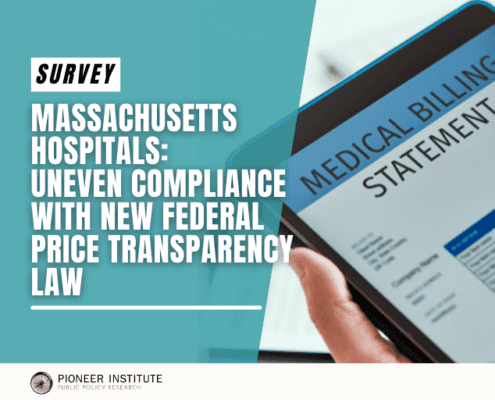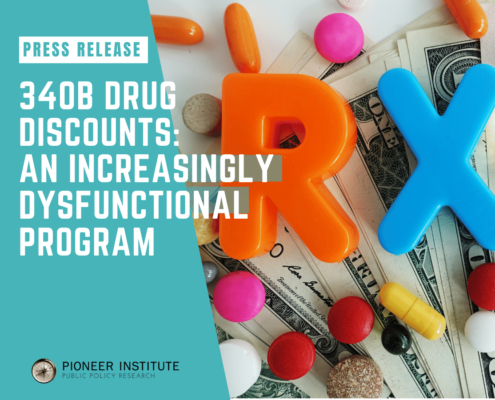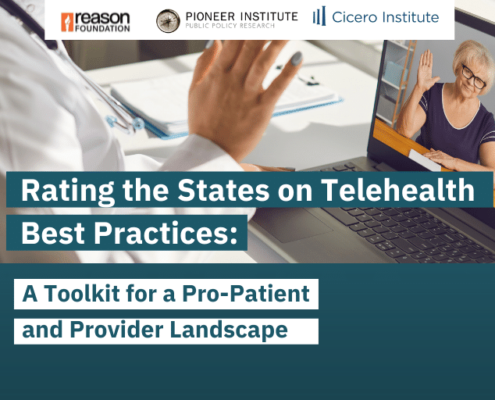
Middlemen Pushing Up Retail Costs of Drugs
The reality is that non-price factors, including several players, are causing net prices to decline and retail prices to increase. Those players include employers, health plans, and pharmacy benefit managers (PBMs), all of whom have continuously circumvented the system through loopholes and complicated systems of reimbursement that tend to hurt patients

Telehealth Progress Slowed in 2023
A new report by Cicero Institute, Pioneer Institute, and Reason Foundation reveals worrying stagnation in state-level telehealth expansion efforts in 2023, with only a few exceptions. Progress made during the pandemic is being lost even as provider shortages worsen, raising concerns about patients’ access to care.

Study: High List Prices and Deep Discounts for Prescription Drugs Hurt Poor and Sick Patients
A new Pioneer Institute study illustrates how the current system of drug pricing and discounts leads to patients with challenging diseases being charged huge out-of-pocket sums to keep other premiums low, effectively imposing financial penalties on the sick to protect the healthy and wealthy.

Massachusetts’ Misguided Middle-Class Health Insurance Subsidy Expansion
A proposal on Beacon Hill to expand insurance subsidies up to 500 percent of the federal poverty level, could push the small business insurance market into a death spiral, without reducing the number of uninsured and hurting those with preexisting conditions.

Study: Massachusetts Should Join 45 States and Allow Prescribers to Dispense Medications
A Pioneer Institute study shows that middlemen—commercial pharmacies and pharmacy benefit managers—add substantial costs over wholesale prices. Allowing prescribers to dispense routine drugs would save consumers money without compromising safety.

Massachusetts Hospitals: Uneven Compliance with New Federal Price Transparency Law
A 2019 federal law requires hospitals to make prices for 300 shoppable services available online in a “consumer-friendly format,” but a Pioneer Institute survey of 19 hospitals finds that information on discounted cash prices—the price most likely to be charged to consumers paying out of pocket—was unavailable at seven of those hospitals.

Comments on How Pharmacy Benefit Managers (PBMs) affect Smaller Pharmacies and Consumers (ID FTC-2022-0015-0001)
Pioneer Institute Senior Fellows William Smith and Robert Popovian submitted public comments about PBM business practices to the Federal Trade Commission (FTC). Pioneer recommended that PBM discounts be passed along to patients when they are meeting their deductible or coinsurance requirements.

340B Drug Discounts: An Increasingly Dysfunctional Program
This report reviews the federal 340B drug discount program, showing that, over the past decade, the revenue for hospitals generated by the program, initially intended to serve low-income, uninsured populations, has exploded even while a number of important Massachusetts hospitals have reduced the level of charity care they provide. The study notes that nationwide, 340B drug sales rose from $9 billion in 2014 to $38 billion in 2020.

Rating the States on Telehealth Best Practices: A Toolkit for a Pro-Patient and Provider Landscape
The toolkit aims to help policymakers take the next step toward a more quality-oriented, affordable, and innovative health system by ensuring that their state laws on telehealth remove deleterious barriers that have historically discriminated against those in certain geographies, such as those living in rural communities or in underserved urban areas. This report explains policy best practices for ensuring that providers and patients can fully realize the benefits of using telehealth services when appropriate and provides a simple-to-read stoplight rating for each state on how closely their policies align with those best practices.

Antimicrobial Resistance: Learning from the current global health crisis to prevent another one
0 Comments
/
The world was blindsided by COVID-19, but a new study finds that…

Key Questions for Legislators on the Institute for Clinical and Economic Review (ICER)
As states continue to grapple with prescription drug costs, a new Pioneer Institute study lays out the key ethical, methodological and disease-specific questions policy makers should address before deciding whether to contract with the Institute for Clinical and Economic Review (ICER) to conduct cost effectiveness reviews used to make decisions about the purchase of medicines and other medical innovations.

What Massachusetts Should Do in an Uncertain Healthcare World
Regardless of what happens in the debate over repealing and replacing the ACA in D.C., Massachusetts has to tackle health care costs intelligently. We need to do more than provide insurance; we need to increase access to care. That means thinking seriously about the role of private market insurers, insurance regulations and the regulation of medical providers.

Counter Point What Massachusetts Should Do As Uncertainty Engulfs US Healthcare System
Regardless of what takes place at a national level, Massachusetts has its own set of challenges to continue pursuing the state’s commitment to universal coverage at affordable prices. This report offers a ten-point program that the state should vigorously focus on in the days ahead.

Over A Decade, The ACA Fee On MassHealth Will Cost Hundreds Of Millions Of Dollars
In “Over a Decade, the ACA Fee on MassHealth Will Cost Hundreds of Millions of Dollars,” authors Lauren Corvese and Josh Archambault examine the potential budget impact of the Health Insurer Provider Fee (HIPF), a revenue-raising mechanism for the Patient Protection and Affordable Care Act (ACA).

Healthcare Prices for Common Procedures Are Hard for Consumers to Obtain Survey finds hospitals not prepared to give price information to consumers
This policy brief is the third in a series of reports on healthcare price transparency prepared by Pioneer Institute. Researchers surveyed six major metropolitan areas and spoke with 54 acute care hospitals across those regions: Des Moines, IA, Raleigh-Durham, NC, Orlando, FL, Dallas-Ft. Worth, TX, New York, NY and Los Angeles, CA asking for the price of an MRI of the left knee without contrast. In addition, they explored the existence of federal and state laws that might apply in the states where the hospitals surveyed are located. They also examined the websites of the 54 hospitals for price information. The results of this survey are described in this policy brief.

What Will U.S. Households Pay for Health Care in the Future
This white paper reports that health care costs for a U.S. family of average income (including family insurance premium contributions and out-of-pocket costs including co-payments, coinsurance and deductibles) could increase from $8,583 annually to $13,213 by 2025, but up to as high as $18,251 in the same year. In terms of proportion of earnings, this would be equivalent to 20 percent and 27 percent of household income by 2025, respectively.

Whistleblowers Expose the Massachusetts Connector
State officials knew that development of a federal Affordable Care Act (ACA) website was off track for more than a year before the October 1, 2013 launch date. Instead of raising concerns about the project, they misled the public by minimizing the shortcomings of the contractor hired to build the website, asked state workers to approve shoddy work and appear to have covered up the project’s abysmal progress in a presentation to federal officials.

New ACA Medicare Payroll Tax Hits Massachusetts, $1.7 Billion Over 10 Years
This brief is part of an occasional series from Pioneer Institute examining the direct effects of the ACA on Massachusetts. Please see the end of the paper for more examples.

Comparing the Clinical Quality and Cost of Secondary Care in Academic Health Centers and in Community Hospitals
This study analyzes data from hospitals in six states, including Massachusetts, to compare the cost and quality of secondary care for under-65, privately insured patients in Academic Health Centers (AHCs) and non-AHC or community hospitals.

Nonprofit to For Profit Conversions in Health Care: A Review
The analysis presented in the paper suggests areas in which caution must be exercised to assure that community benefits provided by nonprofits are preserved in a post-conversion environment, and that full value is realized and appropriately redirected. Nothing in the analysis indicates that nonprofit to for-profit conversion should be barred from consideration in Massachusetts.
